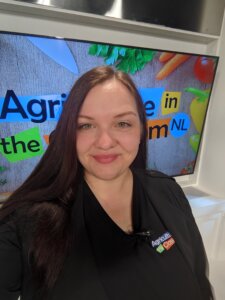Career Profiles
Chelsea Foley

Chelsea Foley
Bringing agriculture careers to Newfoundland and Labrador schools
The majority of Canadians live in urban places, separate from farms, and are thus unaware as to how their food is produced. That’s why Chelsea Foley, a member of the Newfoundland and Labrador Federation of Agriculture, and the province’s Agriculture in the Classroom Coordinator, thinks it’s vital to get information about Canadian farming into school curricula. Foley coordinates Agriculture in the Classroom in Canada’s most easterly province; it is a country-wide program connecting youth to agriculture through hands-on and engaging education programs. “I always knew I wanted to work with youth. I studied child development and psychology in school, which led me in the direction of community studies,” says Foley. “I’ve since developed a passion for agriculture, and find joy in sharing the food stories of the people that provide the food on our plates. Canada’s agriculture sector has inspired me to be mindful of where my food comes from, and I know Agriculture in the Classroom Kindergarten levels to Grade 12. While programming for young children sees them learning about – and actually growing – different crops, older cohorts are shown the breadth and diversity of careers which the agriculture sector offers. “Our Little Green Thumbs program for grade three to six students has them growing stuff like cucumbers, tomatoes, and other crops indoors. Our Little Green Sprouts program for grades Kindergarten to two focuses on microgreens, sunflowers, buckwheat – things which grow a little faster,” says Foley, adding that the idea is to provide a learning experience and a reinforcing feeling of accomplishment. Foley also has the unique opportunity to work with her mother, Maureen, on the program, which is now the largest in Canada. Finding opportunities within the curriculum for older students can be more of a challenge. However, Foley says that Agriculture in the Classroom has had success pairing agriculture subjects within nutrition, science, and even social studies subjects. “A lot of it tries to get people to think about agriculture, and learn about diverse and exciting opportunities in it. Soil scientists, plant scientists, veterinarians – we’re building awareness and building the next generation of informed consumers.”


